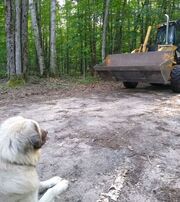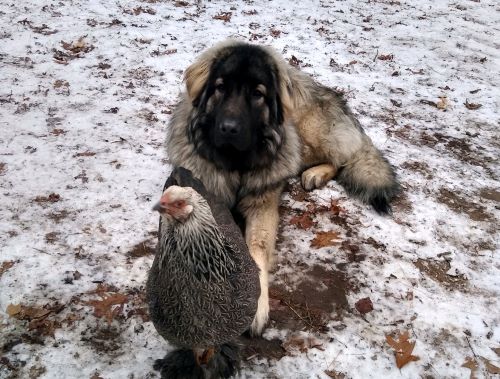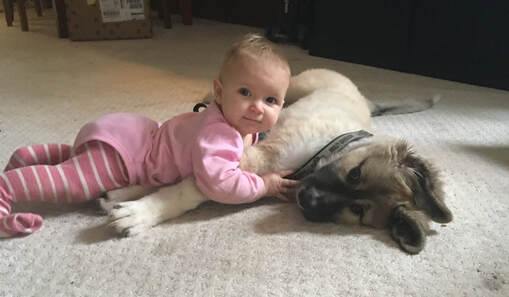|
3/11/2022 Lenna vs. ExcavatorThis is a picture from a hot day in August 2021, just another day in a livestock guardian dog's life.
Lenna has developed into a bit of a leader. A great one, at that. We know when someone arrives at our farm because she is always the first to alert. And being located 700 feet from the road, with a heavily wooded driveway, the humans are not the first to hear someone coming. Lenna heard the excavator before we did. Generally leery toward a new visitor, she quickly alerted, and we reassured her that everything was fine, that this was someone who was here to do a job, and that this person would not be taking her chickens. She became calm, yet still cautious at the sight of the machine that, little did she know, was many thousands of pounds heavier and many feet taller than her (and much noisier). What's interesting, though, is that I truly believe that she felt she could take on this, this . . . . thing that she had never seen before, whatever her mind considered it to be. The heart of an LGD has no defined area or volume. It is not confined to a perimeter like Lenna's fence, and it doesn't evaporate in the hot August sun after a rain. It overflows, but on a plane that is never ending. Quite possibly the most important part of a farm "ecosystem", livestock guardian dogs are the heart of a farm. This blog post contains our farm family's "top 5" reasons why LGDs are amazing. Realize, it's not easy to pick just 5 reasons, so this is not an exhaustive list, but it is one that showcases what we value most from our working dogs. They are, in fact, so amazing, we would never have a different type of dog. Reason 1: Livestock guardian dogs are intelligent There are varying degrees of differences in body sizes, personalities, and strengths from one breed of LGD to another, but there is one consistent trait to all well-bred LGDs: they are smart. They have the ability to think through tough situations when confronted by a predator, and are able to intimidate, deter, or outsmart a threat to their flock with amazing critical thinking. Because of this, they often do not need to be physically confrontational. LGDs also understand key words and phrases and differing voice inflections. Most can be trained to commands, such as sit, stay, down, and drop it. When something may be amiss on the farm, they use their intelligence to figure out what it may be. Reason 2: Livestock guardian dogs are gentle Whether it's a newborn kid or lamb, a small chicken, a piglet, or a toddler, LGDs, although large in size, are gentle-giants around other animals and humans. Though these dogs could easily trample smaller animals, they have an awareness of their surroundings, and it is not an unusual sight to see a chicken practically standing on a lounging LGD or a LGD bonding with a newborn mammal. They are even known to assist in the clean-up process after birth, licking the newborn kid or lamb. This gentleness also corresponds with young toddlers who are a part of the shepherd's family. Livestock guardian dogs are calm with their movements around a young child, careful to tolerate excitement and spontaneity. Reason 3: Livestock guardian dogs are strong willed
Though the trait of being strong willed could cause strife between shepherd and dog if an LGD has not been trained or bonded, it is one that is needed out in the field when guarding the flock. This is why it is necessary to set boundaries and train and spend time with the pup while it learns the routines, interactions, sights, and sounds of the farm. It is especially important during the first 6 months of the dog's life. Later, when the guardian-in-training shows its shepherd that it is ready, it will be tasked with the important job of keeping a flock safe from predators without human assistance. Due to the nature of their work, LGDs need to be able to demonstrate how strong willed they are by being allowed to independently make decisions and confront threats. Livestock guardian dogs are determined and do not shy away from something that is out to get their flock. And they have a work ethic that never falters. Reason 4: Livestock guardian dogs are genetically distinct Dogs have evolved side-by-side with their human counterpart for many years, creating breed specific standards to suit a wide variety of different human needs. Livestock guardian dogs are no different. LGDs can adapt well to different living situations, including being a family companion; however, they thrive when working to protect other animals from predators. In basic terms, their distinct large build, double coat, protective instincts, intelligence, and personality traits make them suitable for jobs on the farm or in the field. The human-canine connection part of this evolution should not be undervalued. What's important to the shepherd will be important to the dog. Reason 5: Livestock guardian dogs are like family Livestock guardian dogs are also an extension of family. When bonded with their shepherd, they will do their job dutifully, every day. Rarely, if at all, are they slack. Being extremely loyal, they never forget what was taught. It is well worth the shepherd's time to bond with the pup, and, once that bond is established, the dog will not want to disappoint the shepherd when it is ready to protect the other animals. LGDs will show unwavering love toward their family and shepherd. |
AuthorWhen she's not baking bread Amanda enjoys going for walks with her girls and making goats milk ice cream. Archives
March 2022
Categories |



 RSS Feed
RSS Feed